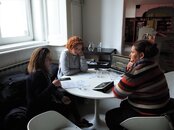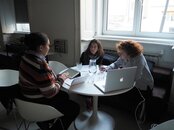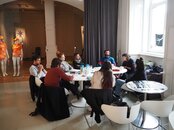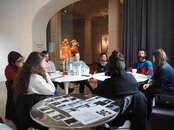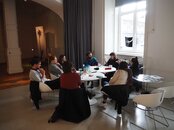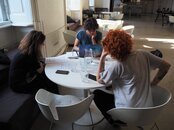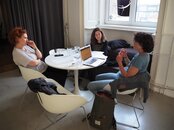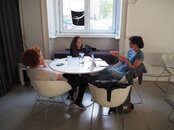As part of our non-formal education program, we are pleased to announce a reading group entitled A Repair Manual for Spaceship Earth. The series of ten meetings will be moderated by art historians and curators Irena Borić and Živa Kleindienst. We will meet weekly from the beginning of April to the beginning of June. The reading group is designed as an open space for meetings, dialogue, conversation and collaborative learning about ecological, socio-political and activist topics, which will be drawn from KIBLA's intermedia productions and the visual exhibition program. The aim of the shared reading of selected texts and collective reflection is to get to know a wide range of artworks and to exchange knowledge on current theories of contemporaneity, the development of technology and the social, political and economic concepts that dictate global shifts and thus condition our everyday lives.
The meetings will be held weekly on Mondays (except for holidays in April and May when the meetings will be moved to Tuesdays) from 11 April to 13 June 2022 at MMC KIBLA (Ulica kneza Koclja 9). The reading group is aimed at a wider, general audience; no professional background is expected, except curiosity, a desire for collaborative learning and sharing of knowledge. We kindly recommend that you read the proposed texts in advance. To register your participation and receive the texts in PDF format, please send an e-mail to irena.boric@kibla.org. Registration is for information only and is not binding.
You are cordially invited!
1. A Game of Cat's Cradle: Science Studies, Feminist Theory, Cultural Studies
Monday, 11 April, at 5:30 p.m.
The series of reading groups will start with a text by the renowned theorist Donna Haraway, in which she begins by pointing out the following: »Nature is a topos, or commonplace. Nature is a topic I cannot avoid. It is the imploded, densely packed location for the simultaneously ethnospecific, cultural, political, and scientific conversations about what the allowable structures of action and the possible plots in the sacred secular dramas of technoscience – as well as in the analysis of technoscience – might be.« Based on this text we will discuss the author's philosophical approach and its relevance today.
2. Toward a Hydrological Turn
Tuesday, 19. 4. at 5.30 p.m.
In this session, we will focus on the text Towards a hydrological turn by Cecilia Chen, Janine MacLeod, and Astrid Neimanis. Our guests will be Armina Pilav, PhD, a feminist, architect, and curator, and Damir Ugljen, an archaeologist and independent researcher, who, in collaboration with KIBLA2LAB, are developing the project Drava Reflections. During their residency in Maribor, Armina and Damir are researching the river Drava and the consequences of the exploitation of this body of water through relational ecologies and XR technologies.
3. Degrowth and the City
Monday, 25 April, at 5:30 p.m.
This time we will look at the text Degrowth and the City by Angelos Varvarousis and Penny Koutrolikou. Based on what we have read, we will learn about the concept of degrowth in the context of urbanism. One of the central questions of the authors of the text is »how can cities become places of experimentation that challenge and transcend the growth imperative? What is the role of architecture and urban planning in this process?«.
The text is available at https://www.e-flux.com/architecture/overgrowth/221623/degrowth-and-the-city/
4. For an Ecological Realpolitik
Tuesday, 3 May, at 5:30 p.m.
The fourth session will focus on the text For an Ecological Realpolitik by the French philosopher Pierre Charbonnier, in which he points out: »Although earth system science has provided us with detailed evidence of the climate imperative, the inertia of the development paradigm and its percolating effect on both international relations and class relations have paralyzed the green turn. Without this engine of growth, how, one wonders, can ‘the social model’ of industrial societies be preserved, and how, one wonders on the other side of the world, can the demands of development be satisfied?«.
The text is available at https://www.e-flux.com/journal/114/365035/for-an-ecological-realpolitik/
5. A Repair Manual for Spaceship Earth
Monday, 9 May, at 5:30 p.m.
The fifth session will be dedicated to the reading of A Repair Manual for Spaceship Earth by political theorist Alyssa Battistoni. Through the text, the author recalls the 1991 experiment in the Arizona desert and wonders about the lessons we can learn about Earth's survival from an otherwise failed experiment.
The text is available at https://logicmag.io/nature/a-repair-manual-for-spaceship-earth/
6. Shit Tech for a Shitty World
Monday, 16 May, at 5:30 p.m.
The sixth meeting will be related to the artistic practice of Sašo Sedlaček, who will be presenting his project Oblomo* at the KiBela, space for art, between 15 April and 14 May. Together we will read Tomislav Medak's text Shit Tech for a Shitty World (2016)*, which deals with the connections between waste, technology and people. Medak also situates the artistic practice of Saša Sedlaček in these relationships. Sedlaček’s work often employs methods of transforming technologies that grow in the shadow of capitalist techno science, such as obsolete hardware or open-source software. Our discussion will draw on the artistic practice of Saša Sedlaček, and together we will reflect on our relationship to technology and (technological) waste in times of climate crisis.
*The exhibition and the text by Tomislav Medak are produced by Aksioma – Institute for Contemporary Art.
7. The Art and Politics of Sustainability
Monday, 23 May, at 5:30 p.m.
The seventh meeting will focus on another work by T. J. Demos, Decolonizing Nature. Contemporary Art and the Politics of Ecology (2016). In this work, the author argues for a post-anthropocentric political ecology, combining aesthetic and indigenous philosophies, and environmental activism as resistance against the neoliberal corporate state system. We will discuss the chapter The Art and Politics of Sustainability (pp. 31–62), focusing on understanding the decolonization of nature and the role of artistic practices in sustainable politics.
8. Decolonizing Nature
Monday, 30 May, 5:30 p.m.
We will devote the eighth meeting to the sixth chapter of the book Decolonizing Nature. Contemporary Art and the Politics of Ecology (2016) entitled Decolonizing Nature. Making the World Matter (pp. 199–228), in which we will search for and discuss examples of constructive artworks and projects to tackle the climate crisis.
9. Ephemeral Screens
Monday, 6 June, 5:30 p.m.
This time we will read the book Digital Rubbish. A natural history of Electronics (2013) by Jennifer Gabrys. It is a study of electronic waste in its physical and electronic incarnations, and a cultural and material mapping of the spaces where electronics in the form of hardware and information accumulates, breaks down or gets cleaned up. The discussion will be based on the chapter Ephemeral Screens. Exchange at the Interface (pp. 45–71), in which the author focuses on the electronic screen as a space and a device through which »the signal and the thing« operate in a disconnected and dematerialized way.
10. Museum of Failure
Monday, 13 June, at 5:30 p.m.
In this final meeting, we will read another chapter from the book Digital Rubbish. A natural history of Electronics. We will focus on the chapter Museum of Failure. The Mutability of Electronic Memory (pp. 101–25) and discuss what happens to obsolete equipment and technology. In what ways does it fall out of the stream of continuous progress? The author is interested in how obsolete technology, instead of representing historical progress, speaks about the materiality and imagination of this technology.
< Visuals: P L A T EA U R E S I D U E, Terra Ignota, 2021, screen capture. Courtesy of the artists.
__
The reading group is part of informal educational program, supported by the Ministry of Culture of the Republic of Slovenia and the Municipality of Maribor.


